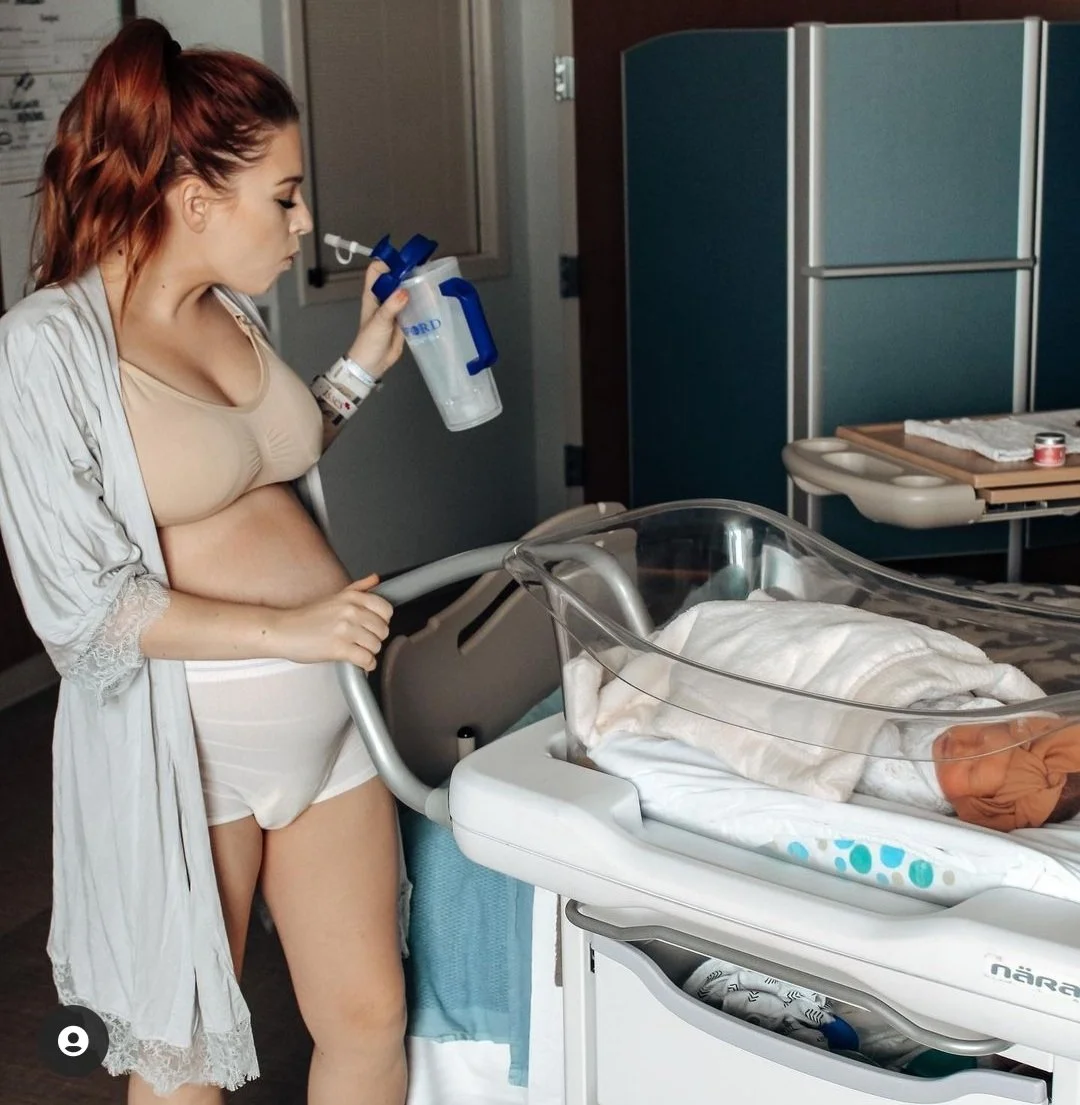Postpartum Recovery
Congrats on your new baby! Enjoy postpartum! See you in 6 weeks! Good luck!
You may have heard this after you delivered your baby. And yes, it’s true. Typically, your follow-up with your doctor occurs 6 weeks after delivery. A LOT can happen over those 6 weeks of postpartum recovery. You may feel that you transform physically, emotionally, and mentally during that time.
(Note: Your baby will be seen within 2 weeks, and, if you have midwifery care, you will be seen sooner and more frequently than with an obstetrician. This is not the fault of obstetricians: we simply do not have enough care providers to provide everyone with early and frequent postpartum follow-up. If you are experiencing any complications or concerns, you must visit the emergency department, or urgent care).
Ice your Undercarriage
Postpartum flow: Yes, you will continue to require pads (or ‘Depends’) for weeks after your baby is born. Your uterus has been through a lot. Be wary though, if you start experiencing bright red bleeding that soaks through pads within an hour of changing them. This can be a sign of postpartum hemorrhage.
Stitches: If you had a vaginal delivery and had stitches, protect their healing by icing on and off, doing warm sitz baths in your tub or an over-the-toilet basin, using a peri bottle, and being gentle when wiping after using the toilet.
If you had a c-section, your skin incision may have been repaired with stitches or staples. Keep this area clean with warm water, no harsh soaps or scrubbing, staples will be removed by a nurse- do not DIY!
Don’t get constipated
Many new parents will tell you that their first post-delivery poop took more strength and mental preparation than the baby itself!
To set yourself up for success, make sure you:
Stay hydrated! This can be a challenge- you’re busy with a new baby, your own recovery, pain, sleep deprivation- it’s easy to forget to drink enough fluids!
Keep moving! It is important to rest, but you also have to keep things moving. No, you don’t have to go jogging or run stairs or anything crazy. Get up once per hour during the day, walk around the house, do a li’l dance with your baby, whatever! Just get SOME movement in during the day.
Include some fibre in your diet (fruits, vegetables, whole grains…), just make sure to take in enough fluids as well!
Don’t be ashamed to ask your provider for a RX for a stool softener!
If you had narcotics such as morphine during your labour, or are taking iron supplements or antibiotics, this is all even more important: constipation is a side effect of these substances!
Respect your breasts!
Your breasts are under a lot of pressure in the immediate postpartum phase: whether you choose to breastfeed or not!
If you choose not to breastfeed, you milk will still come in regardless- make sure to express enough milk for comfort to prevent engorgement and use cool compresses to help prevent discomfort during this time.
If you are breastfeeding, essentially, get milk moving ASAP!! Breastfeeding, hand expression, or pumping ASAP after delivery will set you up for ample milk supply and supports the longevity of your breastfeeding journey!
Breast massage and breast compressions can REALLY help amp up stimulation and milk removal (and thus, milk supply), but remember to be GENTLE!!!
Let’s face it: the majority of your time will be spent feeding your baby. If there are issues or obstacles, it can be devastating. In-home infant feeding support can be a crucial step in your postpartum stage.
Publicly available breastfeeding help is out there (and is free of charge!), however, wait times can be long, and appointments can be shorter than ideal.
Guide to Edmonton-area public and private lactation support
For some, a private lactation consultant is more appropriate. While there is an upfront cost (some coverage plans will reimburse you for in-home RN care! check your coverage!), I am able to spend 2h in your home focusing entirely on you and your baby. Furthermore, I am available to you via text and email for the entire duration of your infant feeding journey!
My Services
Contact me today!
Respect yourSELF!
Let’s face it, this is the most important part of the whole picture! Your mental well-being is imperative to your well-being, as well as that of your baby and your family.
PMADS: Perinatal mood & Anxiety Disorders include postpartum depression, anxiety, OCD, Psychosis, Panic Disorder, Bipolar disorder and Post-traumatic stress disorder.
They affect 20% of postpartum women (and 10% of new dads) in Canada.
Support for postpartum mood disorders is unfortunately lacking. You often don’t see your obstetric care provider until 6 weeks postpartum; you see our baby’s doctor around 2 weeks, but they don’t all screen for PMADS (and, let’s be honest, a lot of these symptoms are easily covered up).
Unfortunately, there is still a stigma with mental health (and an even bigger stigma for new moms)- the thing is, PMADS are SO COMMON!!!! This is not your fault, and it doesn’t mean that you don’t love or don’t want your baby!!
Just as you would get help for bleeding, excessive pain, headaches, nausea, etc, you SHOULD get help for PMADS!!!
Any thoughts of harming yourself or your baby, call 911 immediately! Otherwise, reach out to your family doctor, obstetric provider, or ANY of the amazing mental health providers (in Edmonton, I love @pinehealth…but there are many!)
– Sheena

